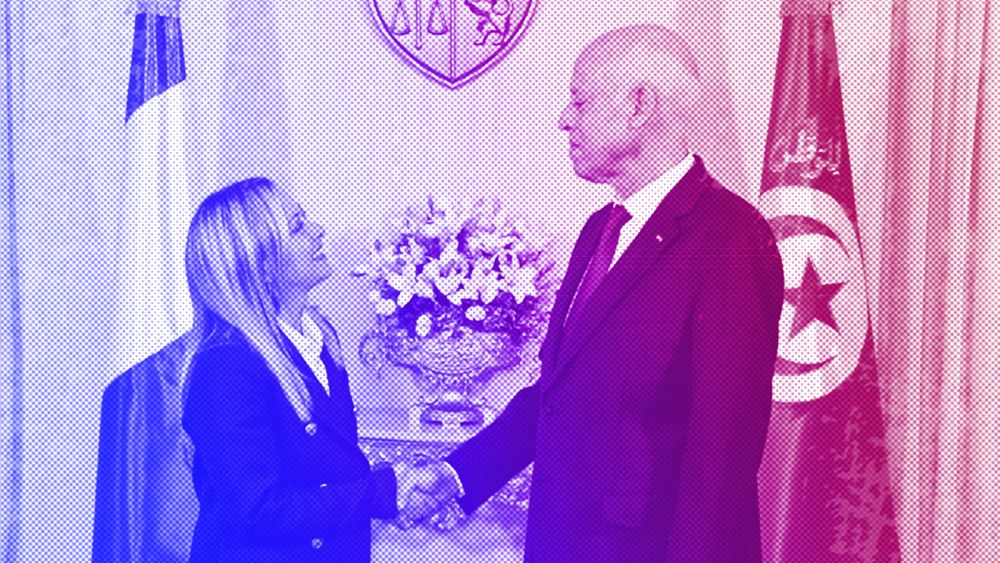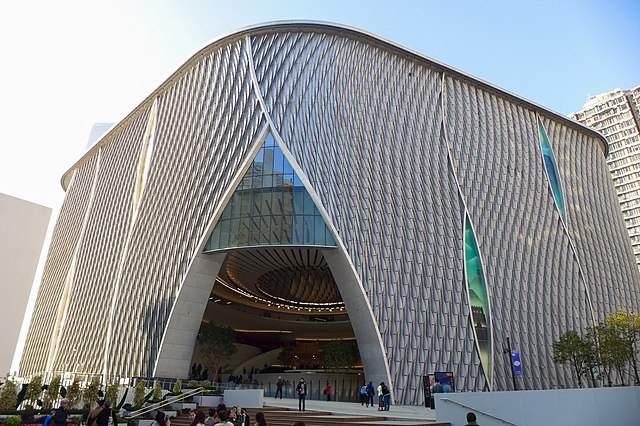By Tarek Megerisi, Senior Policy Fellow, ECFR
During their most recent visit to Tunis, European leaders just threw away the continent’s best chance of living up to its much-professed values and tackling the forces that actually drive Tunisian migration, Tarek Megerisi writes.
Tunisia is suffering. A collapsing economy has caused shortages of basic foods and medicines for over a year now, while inflation has rendered any protein a rare delicacy.
Cities are left without water during the evenings as local agriculture is devastated. And it’s not just the quality of life which is oppressive.
Politicians, judges, journalists, and activists are all being arrested in droves for the crime of standing up to their authoritarian President Kais Saied, who keeps fiddling as his country burns.
After two years of nonchalance, Europe, at last, has been roused into action.
Last week, a coalition led by Italian Prime Minister Giorgia Meloni and including Commission President Ursula Von der Leyen and Dutch PM Mark Rutte travelled to Tunis.
Their timing was almost cinematic, coming shortly after the Tunisian central bank announced it could only afford 91 more days of imports and the country’s credit rating was downgraded yet again.
But the European leaders weren’t coming to help Tunisia: they were desperately trying to stop Tunisian migrants.
And in their panic, they’ve thrown away Europe’s and Tunisia’s best chance to reform its political economy and bring migration under control.
Fears of supercharged migration made European leaders make the wrong call
Emigration out of the North African country has been rising exponentially over the past two years, as young Tunisians progressively lost hope in their country and their capacity to amend the two issues they feel the most passionately about: the lack of economic opportunity and a security service that brutalises rather than protects them.
Europe’s fear is that migration will be supercharged if Tunisia defaults on its crushing loan repayments or runs out of the foreign currency needed for food, fuel and medicinal imports.
What’s even worse is that this crisis is completely unnecessary and could have been avoided altogether.
An IMF cash injection was agreed with Saied’s government last December. But, the populist and paranoid president keeps refusing to sign off on it, repackaging the unpopularity of cutting subsidies to the public sector as a violation of Tunisian sovereignty.
However, he has failed to articulate any plan of his own beyond whispers of an Argentina-style voluntary default.
A golden opportunity wasted
Then, Meloni’s “Team Europe” landed in Tunis under the pretence of trying to get this IMF deal over the line.
Behind that façade, they hashed out a deal to essentially keep Saied afloat so long as his navy dealt with any migrant boats found on their way to Europe.
It’s a story that the region and Russian President Vladimir Putin’s allies will recite the next time Europeans invoke their values to marshal support for Ukraine.
The non-European Mediterranean has witnessed a reaffirmation of European weakness.
This openness to extortion is something other strongmen like Libyan warlord Khalifa Haftar, Egyptian President Abdel-Fattah Sisi and Turkish President Recep Tayyip Erdogan have and will continue to routinely exploit whenever they need a cash injection.
The pressure on all to avoid Tunisia’s economic apocalypse could have been used to amend the IMF deal and include reforms long-demanded by the Tunisians focused on turning the private sector into an engine of wealth creation.
This would’ve given the populist president the optics needed to sign off on the deal and given Tunisians a reason to stay.
But Europe hasn’t just squandered a golden opportunity to reform Tunisia’s economy.
They’ve casually discarded their one tool to protect the country’s democracy and reverse President Saied’s destabilising tyranny: their leverage over Tunisia’s security services.
A small act of accountability would have gone a long way
Saied has always been a typical strongman who, despite first being a constitutional law professor and then writing the new country’s constitution himself, consistently operated outside Tunisian law to achieve authoritarian goals, from freezing out the parliament in 2021 to his current violent arrest campaign.
He has always been wholly reliant on Tunisian security services to support his diktats, from parking their tanks outside parliament to putting political prisoners on trial in front of military courts.
These same security services receive considerable funding from Europe and the USA and privileges including equipment, training programmes, easy travel for their families to Europe, and the prestige of being a major non-NATO ally.
These privileges, which Tunisia’s senior military class are extremely fond of, could’ve been used as leverage to simply demand that they follow Tunisian law if they are to remain part of the liberal world order’s security establishment.
It’s a small act of accountability that could have had a monumental effect in restoring the political opposition, media scrutiny, and rule of law — all parts of a democratic society that Saied has shown to be against — and that could have been the vehicle for change.
Not only has Europe discarded this tool. Even worse: its leaders gave all their power in this relationship to Tunisia’s security structures instead by begging them to become Europe’s border force.
The forces that drive Tunisian migration could have been tackled differently
At the end of Team Europe’s trip, von der Leyen’s unedited message is that Saied and his forces are poised to receive just over €1 billion of European taxpayer money — meaning that Europe will continue to work in Saied’s favour to weaken IMF conditionality by simply covering Tunisia’s debts.
There will be no economic reforms to enable promised trade, no media to report that promised green investments will never come, and no political opposition to scrutinise the cooperation on curbing migration.
Saied’s security services’ salaries and privileges will be ring-fenced. They will receive state-of-the-art European equipment to help them oppress their population.
As a result, young Tunisians will be even more desperate to migrate.
The continent’s leaders just threw away Europe’s best chance of living up to its much-professed values and tackling the forces that actually drive Tunisian migration.
Instead, they committed to paying a billion euros solely to advertise to the wider region that they’re open for extortion.
As Meloni, Rutte, and von der Leyen patted each other on the back on the flight home, the irony that they’ve committed Europe to further years of migration anxiety will be lost on them — just as the rights of Tunisians and the value of democracy was lost on them during their day trip to Tunis.
Tarek Megerisi is a Senior Policy Fellow at the European Council on Foreign Relations (ECFR).
At Euronews, we believe all views matter. Contact us at view@euronews.com to send pitches or submissions and be part of the conversation.




















Discussion about this post